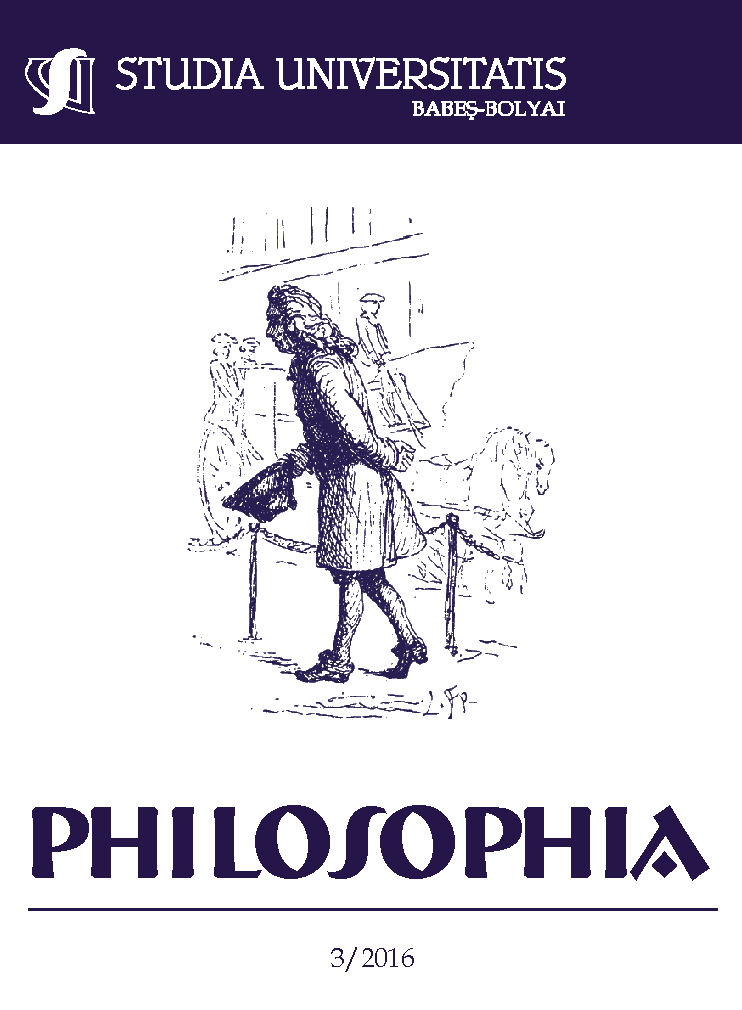DIALECTIC AND ITS ROLE IN ARISTOTLE’S POLITICAL MORPHOLOGY. THE CASE OF DISTINGUISHING OLIGARCHY AND DEMOCRACY
Keywords:
Aristotle, democracy, oligarchy, dialectic, number, wealth, differentia, accidentAbstract
Dialectic and Its Role in Aristotle’s Political Morphology. The Case of Distinguishing Oligarchy and Democracy. Is the number of rulers an essential criterion in distinguishing democracy from oligarchy? This is an important issue tackled by Aristotle in two places from his Politics (III, 8 and IV, 4), an issue that seems to generate disagreement among scholars. Some believe that number is an essential criterion, i.e. a differentia, others that it is an accident. An attempt to solve this disagreement shall be considered from the perspective of Aristotle’s views on dialectics. I will try to show that even if there is no sufficient proof to mandate the interpretation that the number of rulers is a differentia, this position can be defended to some point. In addition, that it is more likely that he considered number to be a particular type of accident.
References
Edition of Aristotle’s works used
The Complete Works of Aristotle: The revised Oxford Translation, edited by Jonathan Barnes, 2 volumes, Princeton: Princeton University Press, 1984. All the quoted fragments are from the translations found in this edition.
Edition of Plato’s works used
Plato, Complete Works, edited, with Introduction and Notes, by John M. Cooper, Associate Editor D. S. Hutchinson, Indianapolis/Cambridge: Hackett Publishing Company, 1997. All the quoted fragments are from the translations found in this edition.
REFERENCES
(Barnes 2003) Porphyry, Introduction, translated, with a commentary, by Jonathan Barnes, Oxford: Clarendon Press, 2003.
(Bereschi 2009) Andrei Bereschi, “La theorie des formes politiques dans l’antiquité grecque (Platon, Aristote et Polybe)”, in Studia UBB. Philosophia, LIV, 1, 2009, pp. 3-23.
(Blythe 1992) James M. Blythe, Ideal Government and the Mixed Constitution in the Middle Ages, Princeton: Princeton University Press, 1992.
(Dooley 1994) Alexander of Aphrodisias, On Aristotle’s Metaphysics 5, translated and notes by William E. Dooley, S.J., Ithaca, New York: Cornell University Press, 1994.
(Keyt & Miller 1991) A Companion to Aristotle’s Politics, edited by David Keyt and Fred. D. Miller, Jr., Blackwell, 1991.
(Mulgan 1991) Richard Mulgan, “Aristotle’s Analysis of Oligarchy and Democracy”, in A Companion to Aristotle’s Politics, edited by David Keyt and Fred. D. Miller, Jr., Blackwell, 1991.
(Newman 1887)The Politics of Aristotle, with an introduction, two prefatory essays and notes critical and explanatory by W. L. Newman, vol. 1, Oxford: Clarendon Press, 1887.
(Newman 1902) The Politics of Aristotle, with an introduction, two prefatory essays and notes critical and explanatory by W. L. Newman, vol. 4, Oxford: Clarendon Press, 1902.
(Owen 1961) G.E.L. Owen, “Tithenai ta phainomena”, in S. Mansion (ed.), Aristote et les problèmes de méthode, Louvain: Presses Universitaires de Louvain, 1961, pp. 113-126.
(Pellegrin 1986) Pierre Pellegrin, Aristotle’s Classification of Animals, translated by Anthony Preus, University of California Press, 1986.
(Reeve 1998) Aristotle, Politics, translated with Introduction and Notes, by C. D. C. Reeve, Indianapolis/Cambridge: Hackett Publishing Company, 1998.
(Ross 1924) Aristotle’s Metaphysics, a revised text with introduction and commentary by W. D. Ross, vol. 1, Oxford: Clarendon Press, 1924.
(Rowe 2005), C. Rowe, “Aristotelian Constitutions”, in The Cambridge History of Greek and Roman Political Thought, CUP, 2005.
(Rowe et al. 2005) The Cambridge History of Greek and Roman Political Thought, edited by C. Rowe, M. Schofield, S. Harrison, M. Lane, Cambridge University Press, 2005.
(Simpson 1998) Peter L. Phillips Simpson, A Philosophical Commentary on the Politics of Aristotle, The University of North Carolina Press, 1998.
Downloads
Published
How to Cite
Issue
Section
License
Copyright (c) 2016 Studia Universitatis Babeș-Bolyai Philosophia

This work is licensed under a Creative Commons Attribution-NonCommercial-NoDerivatives 4.0 International License.





